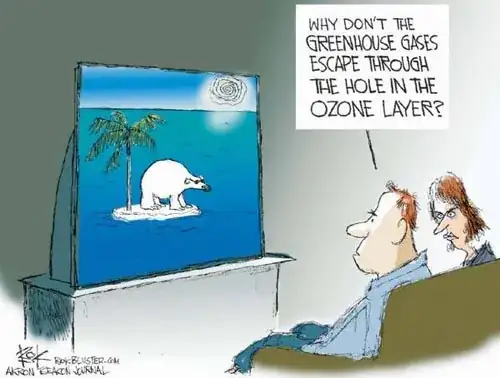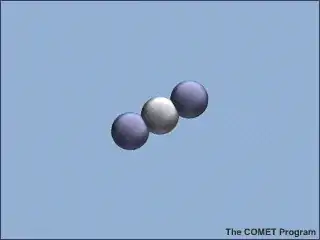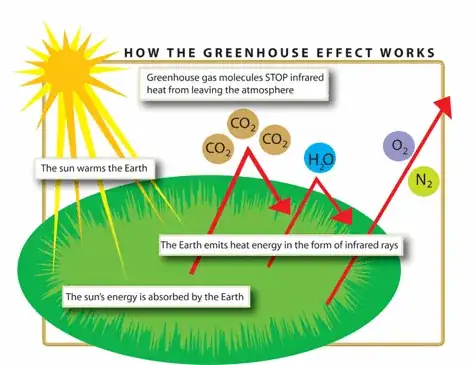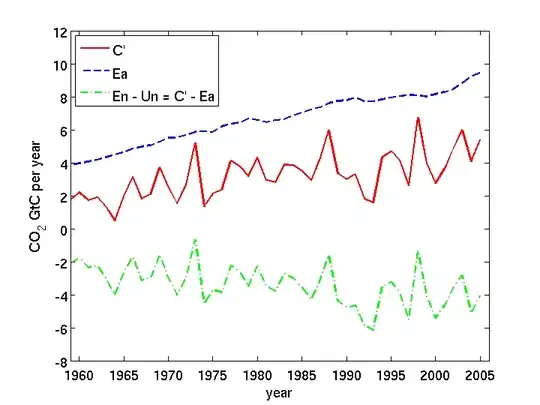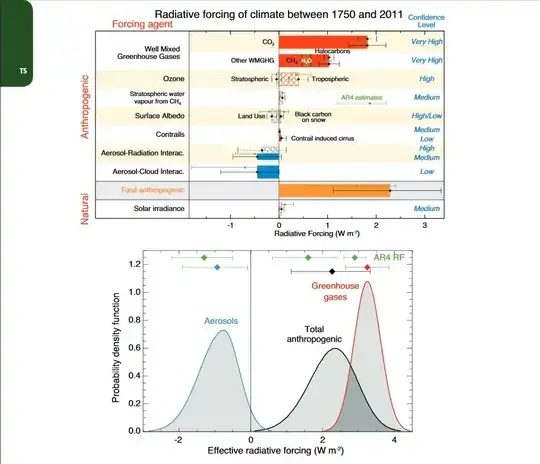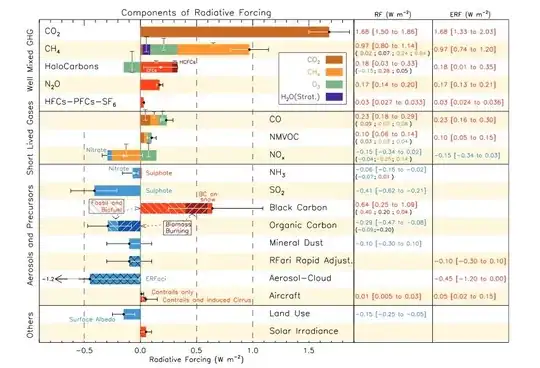I know there is global warming, and I know that it is caused by human activity, but is carbon dioxide the cause of it? I read somewhere that apparently increase of CO₂ doesn't cause the increase in global temperatures, but rather, global temperatures cause the increase of CO₂. Can someone verify or disprove this claim?
-
28How do you know that humans have caused global warming if you doubt that CO2 is behind it? – Andrew Grimm May 20 '11 at 12:45
-
1Is this essentially a duplicate of http://skeptics.stackexchange.com/questions/41/is-there-any-solid-causal-evidence-for-human-activities-contributing-to-climate-c – Andrew Grimm May 20 '11 at 15:39
-
Humans can cause Global Warming through other means. – Thursagen May 21 '11 at 03:00
-
2It depends what you mean by cause and how far you want to trace the effects (even if you accept the consensus on warming). Higher CO2 doesn't directly account for the majority of projected warming in models: most warming comes from other forcing effects such as higher water concentrations and other feedbacks. So even in standard climate models it isn't the CO2 that directly causes the warming. – matt_black Jul 17 '12 at 10:47
-
7Do note that you have a false dilemma. It's also possible that carbon dioxide in the atmosphere increases the global temperatures, AND an increase in global temperatures increases the amount of carbon dioxide in the atmosphere. What a nasty feedback loop that would be... – Kaz Dragon Jun 03 '13 at 12:24
-
OR it's possible that there is no positive feedback at all, and that an increase in one causes through some means a decline in the other, or at least creates a condition that's conducive to the other declining. Think increasing temperatures (caused by increasing CO2 or not) causing conditions in which forests and algae banks grow better, absorbing more CO2, which causes CO2 levels to decline, which results (IF the "CO2 causes global warming" adherents are correct) a decline in temperatures, flattening out the curve. – jwenting Jun 04 '13 at 05:58
-
3True jwenting, though, of course, the net positive feedbacks have actually been measured through paleoclimate data, whereas the net negative feedback is based on wishful thinking. – Mark Jun 05 '13 at 02:15
-
1@Mark actually, no positive feedback has ever been established except in climate science except the one between alarmism and budgets. – jwenting Sep 12 '13 at 08:39
-
2Are you seriously saying that no positive feedback has ever been established outside climate science budgeting? Or just a humorous note? – Mark Sep 12 '13 at 09:53
-
1@AndrewGrimm: Asking if CO2 is the cause and asking if GW is anthropogenic are completely different questions. There are other gases that are beyond doubt man-made and per same amount of gas, have tens of thousands times more greenhouse potential. http://en.wikipedia.org/wiki/Global-warming_potential#Values So this question is basically about demonstrating that there is so little of them, that they don't have significant effect on GW. – vartec Feb 08 '15 at 04:35
-
You need to cite your sources when you invoke things like "I read somewhere...". I clicked your link to some website called http://www.warmingscaretactics.com/, and the link resulted in an IP-Address-not-found error message, meaning the server hosting your URL is no longer running. In particular, given that you are posting on *skeptics*, your sources should be considerably strong, in other words referencing actual publications, especially peer-reviewed and scientific ones, and minimally sources that actually exist. Consider improving your literature standards. – JoseOrtiz3 Feb 05 '19 at 20:54
-
Does this answer your question? [Do human activities contribute to climate change?](https://skeptics.stackexchange.com/questions/41/do-human-activities-contribute-to-climate-change) – coagmano Apr 30 '20 at 05:22
5 Answers
Carbon dioxide is one of the greenhouse gases.
When its atoms are bonded tightly together, the carbon dioxide molecule can absorb infrared radiation and the molecule starts to vibrate.
Eventually, the vibrating molecule will emit the radiation again, and it will likely be absorbed by yet another greenhouse gas molecule.
This absorption-emission-absorption cycle serves to keep the heat near the surface, effectively insulating the surface from the cold of space.
Here are some research papers on the absorption properties of CO2.
From John Cook:
In 1970, NASA launched the IRIS satellite that measured infrared spectra between 400 cm-1 to 1600 cm-1.
In 1996, the Japanese Space Agency launched the IMG satellite which recorded similar observations.[Harries 2001] compared both sets of data to discern any changes in outgoing radiation over the 26 year period.
What they found was a drop in outgoing radiation at the wavelength bands that greenhouse gases such as CO2 and methane (CH4) absorb energy.
The change in outgoing radiation was consistent with theoretical expectations.
Thus the paper found "direct experimental evidence for a significant increase in the Earth's greenhouse effect".This result has been confirmed by subsequent papers using data from later satellites (Griggs 2004, Chen 2007).
Simply put:
Satellites measuring infrared (heat) radiation coming from our Earth found that CO2 (and other greenhouse gases) won't let it escape into space.
-
Without preliminary explanation it’s not clear how the infrared spectra are relevant, and hence how the first citation is relevant (so I’m suggesting modifying the order of your explanation a bit). – Konrad Rudolph May 20 '11 at 14:49
-
-
4
-
1in regards to the picture, why don't the greenhouse gases stop the heat from entering the atmosphere? – msmucker0527 Jun 24 '14 at 15:30
-
4@msmucker0527: because CO2 is largely transparent to *visible* light. Light comes in as visible light, gets absorbed by the surface and re-emitted as infrared, and can't get out. The atmosphere is a partial one-way door for energy. – Jun 24 '14 at 17:59
The Earth’s greenhouse effect is a natural occurrence that helps regulate the temperature of our planet. When the Sun heats the Earth, some of this heat escapes back to space. The rest of the heat, also known as infrared radiation, is trapped in the atmosphere by clouds and greenhouse gases, such as water vapor and carbon dioxide. If all of these greenhouse gases were to suddenly disappear, our planet would be 60ºF (33ºC) colder and would not support life as we know it. Human activities have enhanced the natural greenhouse effect by adding greenhouse gases to the atmosphere, very likely (greater than 90 percent chance) causing the Earth’s average temperature to rise. These additional greenhouse gases come from burning fossil fuels such as coal, natural gas, and oil to power our cars, factories, power plants, homes, offices, and schools. Cutting down trees, generating waste and farming also produce greenhouse gases.
Source: The Environmental Protection Agency (EPA) (via the Internet Archive: URLs listed here are the original locations)
http://www.epa.gov/climatechange/fq/science.html, as it appeared in May 2012
You may also want to read:
http://www.epa.gov/climatechange/science/stateofknowledge.html, as it appeared in May 2012
This page acknowledges the gaps in scientific climate knowledge, and differentiates fact from speculation/uncertain predictions.
Update:
Adding a NASA site which specifically references CO2 as a greenhouse gas: https://climate.nasa.gov/vital-signs/carbon-dioxide/
- 373
- 3
- 6
-
The "90% chance" phrase suggests that it is a quantifiable matter of chance. It is a sound explanatory theory backed by evidence and espoused by the vast majority of professionals. – einpoklum Feb 06 '19 at 12:54
-
1Your quote don't say anything about CO2 in particular, though. I see that the answer is accepted but I'm frustrated since i wanted to know about the CO2 particular role, to be honest. – GlorfSf Feb 06 '19 at 15:15
-
@GlorfSf Thanks for your feedback. I added a link to NASA's website which talks specifically about CO2. – RMorrisey Feb 06 '19 at 21:50
-
A rather late answer on this question, but here goes: The idea that "global temperatures cause the increase of CO2." is fairly easily refuted. The line of reasoning is that the solubility of CO2 in water decreases as temperature increases, so the rise in global temperature implies that the oceans will have released some of the dissolved CO2 that it contains. The premise is correct, but the conclusion is a Non sequitur as it ignores the fact that the solubility of CO2 in water also depends on the difference in partial pressure of CO2 between the ocean and the atmosphere. As we have released CO2 from fossil fuels into the atmosphere, the partial pressure of CO2 in the atmosphere has risen, and so the oceans have been taking up more CO2, not less.
How do we know this is true? . The argument is easily refuted by the observation that the rate at which atmospheric CO2 levels are rising is less than the rate at which we are releasing CO2 into the atmosphere from fossil fuel use, which implies that the natural environment must be a net carbon sink, taking in more carbon each year than it emits.
More formally, let Ea represent annual carbon emissions from anthropogenic sources (fossil fuel use and land use change), En represent the carbon emissions from all natural sources (the oceans, soil respiration, volcanos etc.) and Un represent the uptake of carbon by all natural carbon sinks (oceans, photosynthesis, etc.), Ua would be the uptake of carbon due to anthropogenic activities, but this is essentially zero, so we can safely exclude it from the analysis. Then assuming that the carbon cycle obeys the principle of conservation of mass (any carbon emitted into the atmosphere that is not taken up by natural sinks remains in the atmosphere), the annual change in atmospheric CO2 is given by:
C' = Ea + En - Un
This can be rearranged to give an estimate of the difference between annual emissions from all natural sources and annual natural uptake by all natural sinks.
En - Un = C' - Ea
We have accurate, reliable data for the growth of atmospheric CO2 and for anthropogenic emissions (for details, see Cawley, 2011). Both of these are displayed below, along with an estimate of the net natural carbon flux En - Un. The fact that the net natural flux is negative clearly shows that natural uptake has exceeded natural emissions every year for the last fifty years at least, and hence has been opposing, rather than causing the observed rise in atmospheric CO2.
Some time back, I wrote a journal paper refuting a related climate myth, which outlines some of the evidence that the rise in atmospheric CO2 is anthropogenic, and is not a natural phenomenon.
I find it hard to understand how this argument can be so ubiquitous on climate blogs, given that it is so easily refuted. For further information, see the many articles on SkepticalScience.com addressing this issue (and other climate myths).
-
@jwenting In case you hadn’t noticed, you’re talking to one (AGW believer, that is). :p – Also, nobody got banned yet for posting facts here so stop spreading demonstrable falsehoods. Heck, we didn’t even block Christopher Monckton, despite him being known for lying through his teeth on the subject. – Konrad Rudolph Sep 12 '13 at 10:34
-
3I wouldn't characterise myself as an "AGW believer", I just try to understand the science (and check out claims to see if the data actually do support the claim, which is how I ended up writing a paper for Energy and Fuels). I generally find that mainstream climatologists are rather better supported by the evidence than extremes on either side. – Sep 12 '13 at 11:09
-
@KonradRudolph - Sorry if this is a "basic" question, but what is `"AGW"`? I assme `"GW"` is "Global Warming", but what is `"AGW"`? – Kevin Fegan Nov 22 '16 at 19:58
-
-
1@KevinFegan (In addition to Dikran’s comment): in other words: human-caused climate change. – Konrad Rudolph Nov 23 '16 at 10:26
-
So basically, this would be true if we weren't also adding excess CO2 into the air at rates higher than the increase in temperatures increases solubility? – JMac Feb 07 '19 at 12:11
-
-
@DikranMarsupial Right, getting sources and sinks all jumbled in my mind, I meant decreasing solubility of water in my head, but was thinking of the solubility of the air when I wrote that. – JMac Feb 07 '19 at 16:12
-
@JMac, the analysis I gave is just an accounting of the carbon as it moves through the carbon cycle - it would be true whatever the natural mechanisms. The main effect is the other half of Henry's law which says the solubility depends on the difference between the concentration in the surface ocean and the partial pressure in the air. The temperature dependendence IIRC only makes perhaps 10ppm difference over the post-industrial era. – Feb 07 '19 at 16:16
-
Putting CO2 into the atmosphere from fossil fuels increases that pressure difference, and that increases the ocean uptake (at least as far as the thermocline). – Feb 07 '19 at 16:17
-
@DikranMarsupial I guess what I was getting at is I could somewhat understand the notion of "decreased solubility (higher temperature) of the water leads to more in the air" in isolation; but that anyone who tries to apply that to global CO2 emissions and temperature disregards that it doesn't happen in isolation. If we were causing global warming without increasing airborne CO2 for example, my understanding is that we would be changing the balance and dissolving more CO2 in the water. – JMac Feb 07 '19 at 16:22
-
Yes, an increase in temperature (whatever the cause) without an additional source of CO2 would be expected to cause a rise in atmospheric CO2 due to degassing of the oceans, but paleoclimate (difference between glacial and intergacial conditions) suggests that would only be a few tens of ppm, and all of that only after the oceans had largely reached thermal equilibrium (hundreds of hears). – Feb 07 '19 at 16:26
-
@JMac, didn't you mean, "we would be changing the balance and outgassing more CO2 from the water"? – elliot svensson Feb 07 '19 at 20:20
-
@elliotsvensson Yup lol. I'm clearly struggling a lot to keep track of the direction this is flowing when I'm typing it. It's making sense in my head, but every time I type it I mix up the source and sink and/or the flow direction. – JMac Feb 07 '19 at 20:23
-
@JMac, I read a study that adjusted estimates [higher](https://www.atmos-chem-phys.net/18/845/2018/acp-18-845-2018.pdf) of how powerful the cloud-forming effects are of sulfur emissions; if significant, what would that mean for policy recommendations: more warning of CO2 danger or less? – elliot svensson Feb 07 '19 at 20:27
-
1@elliotsvensson why don't you try reading the IPCC reports. There has been a *lot* of research on aerosols going back to the 1960s. It is a bad idea to pay too much attention to a single study as being published is only the first step to acceptance by the research community, not the last. Especially when you know perfectly well the same group has published a paper saying it has no significant impact on climate. That is pretty shabby "skepticism" IMHO. https://skeptics.stackexchange.com/questions/5983/do-the-recent-cloud-results-have-significant-implications-for-global-warming/36180#36180 – Feb 08 '19 at 08:09
-
@DikranMarsupial, you are an "AGW believer": you support a website, skepticalscience.com, dedicated to squelching heuristics opposed to CO2-limiting policies such as all-renewable power generation. Such a website is the action of a person _convinced_. – elliot svensson Feb 10 '19 at 18:05
-
1@elliotsvensson yawn, ad-hominems are no substitute for cogent scientific argument. Note it is you, not me, that is being selective about the information presented. You know perfectly well that the CLOUD group published a paper saying that there was no significant impact of cosmic cloud forming, and yet here you are again promoting it without mentioning that slight fly in the ointment! – Feb 11 '19 at 09:28
-
@DikranMarsupial, I wouldn't have called you anything if you hadn't previously denied the title, which is a fair description of your stance. Your Oct 2016 paper, ["Reduced anthropogenic aerosol..."](https://www.pnas.org/content/113/43/12053.short]) reduces our estimate of CO2's effect by somewhere between 5-20%. I don't believe that this is not significant, and it's weird that you wouldn't be more pleased with this result. – elliot svensson Feb 11 '19 at 15:21
-
@elliotsvensson sorry, I have no interest in having scientific discussions with people that resort to ad-hominems when their errors are pointed out. It is an indication that they are unable to admit they are wrong. – Feb 11 '19 at 17:31
I think there is some "chicken and egg" confusion.
CO2 is absolutely a greenhouse gas, and absolutely traps heat. It does, and always has caused warming.
The part that confounds the casual observer is this - CO2 hasn't always been the initial trigger for warming events. There has to be some mechanism for increased CO2 released into the atmosphere. So, if you look at a graph of CO2 concentrations and warming, in the past you'd see warming happen before CO2 levels would increase. However, that doesn't mean that the CO2 didn't contribute to warming, once released.
In pre-mankind warming events, what often happened was that stores of CO2 were sequestered in ways where, if there was warming, would release the CO2, and then the released CO2 would increase or prolong the warming event.
The difference, now, is that humans have actively taken that CO2 and released it into the atmosphere by extracting sequestered fossil fuels and burning them. In this case, there was no warming event caused by natural factors to release certain stores of CO2, as humans actively extracted carbon that was taken out of circulation over eons.
What the science says....
When the Earth comes out of an ice age, the warming is not initiated by CO2 but by changes in the Earth's orbit. The warming causes the oceans to release CO2. The CO2 amplifies the warming and mixes through the atmosphere, spreading warming throughout the planet. So CO2 causes warming AND rising temperature causes CO2 rise. Overall, about 90% of the global warming occurs after the CO2 increase.
Skeptical Science: CO2 lags temperature - what does it mean?
- 9,608
- 3
- 34
- 41
-
One, tiny, perhaps too nuanced quibble: it's not*just* CO2, but greenhouse gases in total ie. man's actions. known sins + CH4 H2S … -> CO2 is *a factor* in global climate. // Q: 'causin': then this is about alterating the supposed equilibrium: bogus. But, unless we know all factors + dynamics (conclusiely) , best bet to hedge on stable conditions? – LangLаngС Feb 07 '19 at 01:02
-
@LangLangC - That's only a quibble if we're asking if CO2 causes all of the warming. The question is merely does it cause warming (it does) and how historical lags of concentrations can be explained if CO2 causes warming. There is no claim, implied or explicit, in the question or in my answer that CO2 is the sole warming gas overall, or the sole warming gas produced by man. – PoloHoleSet Feb 07 '19 at 16:29
-
3As I wrote: tiny. QTitle: Does CO2? Yes. Easy. QBody: Is CO2 *the* cause? For a very large part of it, yes. But complicated. Very minor shift in reading the Q. – LangLаngС Feb 07 '19 at 16:42
-
You don't show whether CO2 is a major factor or just contributing factor and to what extend. – akostadinov Apr 30 '20 at 09:44
-
1@akostadinov - I don't show whether water is wet, either. This is pretty well-established that it is, currently, THE major factor, and the extent of warming has been exhaustively tracked and studied. If you have doubts about it, or can't find evidence or documentation just about anywhere, then congratulations on your recent awakening from a decades-long coma. – PoloHoleSet May 04 '20 at 15:32
Yes, but it's not the only cause.
Aerosols that people release (such as sulfate and amines) affect climate just like the carbon dioxide that we release, but the aerosols cause global cooling, not global warming. Also, the effect from carbon dioxide is 2-3 times as strong as the known effect from aerosols. Here's an excerpt from the Fifth Assessment Report of the IPCC.
Natural forcing changes over the last 15 years have likely offset a substantial fraction (at least 30%) of the anthropogenic forcing increase during this period (Box TS.3). Forcing by CO2 is the largest single contributor to the total forcing during the Industrial Era and from 1980-2011. Compared to the entire Industrial Era, the dominance of CO2 forcing is larger for the 1980-2011 change with respect to other [well-mixed greenhouse gases], and there is high confidence that the offset from aerosol forcing to [well-mixed greenhouse gas] forcing during this period was much smaller than over the 1950-1980 period. {8.5.2}
...
Emissions of SO2, organic carbon and ammonia cause a negative forcing [global cooling], while emissions of black carbon lead to positive forcing [global warming] via aerosol-radiation interactions.
There is still low agreement on the time evolution of the total aerosol [effective radiative forcing], which is the primary factor for the uncertainty in the total anthropogenic forcing.
5th Climate Assessment Technical Summary - IPCC page 56, [bracketed expressions by Elliot]
The Aerosol-Cloud error bar of -1.2 indicates that aerosol-caused clouds are known to have a very strong cooling affect.
One component of the expected future global warming is already 'in the system': as global development improves, reductions emissions (aerosol and other) will reduce cloud cover and the earth's temperature will rise somewhat. This is quite independent of the warming effect of any CO2 emissions and attempts to control that.
Further Reading
- 2,883
- 13
- 38
-
3You might want to adjust your "affect climate ***just as much as*** the carbon dioxide" statement, since the report and the charts you posted to not support that claim. I'll be happy to delve into what I think that chart is showing vs what you do, if you'd like. In particular, those probability bell curves - the "total" curve is the combination of the aerosol and greenhouse gas curves, so it's location to the right of zero indicates that the greenhouse gases have a greater impact. – PoloHoleSet Feb 06 '19 at 22:33
-
1@PoloHoleSet, what adjustment would you suggest to better match the graphic and the underlying message? – elliot svensson Feb 06 '19 at 22:50
-
maybe "affects climate about a third as much as carbon dioxide, but in the opposite direction" (since the modal aerosol effect is about -1 deg, while the model CO2 effect is about +3 deg)? – Ben Bolker Feb 06 '19 at 22:51
-
2Well.... "it's not the only cause," in your "title" - and then talking mostly about a counter-acting force instead of the other warming factors. So, there, maybe "factor" instead of "cause." Maybe for that statement I highlighted, something to the effect of "can counteract a good portion" or something vague like that, since we've actively worked to reduce aerosol emissions, so trying to somehow equate the two even for comparison purposes would be somewhat problematic. – PoloHoleSet Feb 06 '19 at 22:55
-
1Here is another diagram from AR5, which states that the effect of GHG is responsible for *more* than the observed warming since 1951, i.e. the net effect of everything else is *negative* (and that the natural effects are small, most likely approximately zero) https://ar5-syr.ipcc.ch/ipcc/sites/default/files/AR5_SYR_Figure_1.9.png See also forcings relative to 1751 https://ar5-syr.ipcc.ch/ipcc/sites/default/files/AR5_SYR_Figure_1.4.png – Feb 07 '19 at 18:02
-
1@DikranMarsupial, that means that my answer is helpful! A big reduction in aerosols could also cause global warming and probably already has. – elliot svensson Feb 07 '19 at 19:38
-
1@elliotsvensson the question is "Does CO₂ cause Global Warming?" and GHG emissions are responsible for more than the observed warming, so the answer is unequivocally "yes". It ought to be obvious to anyone with more than a passing interest in the subject that it is not the only influence on climate, so your answer is a misleading and unhelpful distraction. IMHO – Feb 07 '19 at 19:41
-
1@DikranMarsupial, I think that my answer is helpful because it expands on the question's expression, "the cause"... I'm saying, "it's 'a cause' but not 'the cause'". – elliot svensson Feb 07 '19 at 19:43
-
1@DikranMarsupial, I assert that CO2 is not the only significant anthropogenic cause of global warming, and that's forgetting to mention land use and black carbon-on-snow effects. – elliot svensson Feb 07 '19 at 19:45
-
1@elliotsvensson IYHO, not mine. The IPCC diagram show those are relatively minor factors. – Feb 07 '19 at 19:48
-
1@DikranMarsupial, the aerosols and aerosol-clouds are less, but not minor. It's false to say that "CO2 is the cause of AGW" when AGW is also caused by aerosol-cloud-reductions. I would agree with you if the relative importance ratios were more like 10; at 2-3, the extra information is helpful. – elliot svensson Feb 07 '19 at 19:57
-
1@DikranMarsupial, to that end, a simple "Yes" in this Q&A is ambiguous: does it answer the (revised) title question, "Does CO2 cause global warming?" or the first appearance of a question in the body: "is carbon dioxide the cause of [global warming]?" – elliot svensson Feb 07 '19 at 19:59
-
@elliotsvensson the IPCC diagram https://ar5-syr.ipcc.ch/ipcc/sites/default/files/AR5_SYR_Figure_1.9.png shows that GHG forcing (water vapour is a feedback not a forcing) is responsible for more than all of the observed modern warming, so the answer is still "yes". CO2 is the major GHG in that bar. – Feb 09 '19 at 10:03
-
1@DikranMarsupial, I hope you noticed that the graphs shown in my Answer above are from the latest IPCC reports; a major difference toward your graph is that mine show since the year 1750 and yours since the year 1950. For what it's worth, on the face of it, your graph is annoyingly inconclusive and a little weird: how did the combined anthropogenic forcing get such a narrow uncertainty bar on top of the very wide uncertainties of the two component anthropogenic forcings? – elliot svensson Feb 10 '19 at 18:01
-
1@elliot, I presented the one with post 1750 forcings earlier in the discussion. If you really want to know the answer to your quibbles, read the report. – Feb 11 '19 at 09:30
-
1@DikranMarsupial, actually those error bars at AR5_SYR Figure 1.9 / [Figure TS.10](https://www.ipcc.ch/site/assets/uploads/2018/02/WG1AR5_TS_FINAL.pdf#page=34) are really important, and exactly represent my point here: we _don't know_ the extent of the non-greenhouse gas anthropogenic forcings. Are they high? Are they low? If high, then CO2 is less important as a driver. If low, then CO2 is more important. How foolish to downplay the possibility that other drivers are quite significant, and to direct attention away from research that is shedding light on that! – elliot svensson Feb 11 '19 at 15:32
-
@elliotsvensson given your ad-hominem attack on another thread (https://skeptics.stackexchange.com/questions/3435/does-co%e2%82%82-cause-global-warming/17707?noredirect=1#comment195515_17707) there seems little point in continuing the discussion here either. Read the IPCC WG1 report for answers to your concerns. – Feb 11 '19 at 17:33
-
1@DikranMarsupial, I'm not curious about the IPCC report: I'm publishing my answer to a question here at Skeptics. If my answer is incorrect, please use these comments to show that or just let the current negative voting stand. Calling you an "AGW believer" is not ad-hominem: it is a correct interpretation of your stance, which involves blanket assertions that "if I had read the IPCC reports I wouldn't be doing what I'm doing right now". Why aren't you addressing my comment about the error bars? Is it because I'm not the right kind of person to ask this question? – elliot svensson Feb 11 '19 at 17:52
-
1@DikranMarsupial, I wanted to sign the truth pledge, but I choked with "Defer: recognize the opinions of experts as more likely to be accurate when the facts are disputed". I'm sorry, I'm more of a paradigm-shift enthusiast than a scientific-consensus enthusiast, and so I can't. – elliot svensson Feb 11 '19 at 17:57
-
1@DikranMarsupial, maybe now's a good time to mention that I'm a registered engineer, and by the power vested in me by the great State of California, "an expert". – elliot svensson Feb 11 '19 at 18:28
-
-
@elliotsvensson yawn. Sorry, I am really not interested in this kind of blog-wars rhetoric. – Feb 12 '19 at 07:57
